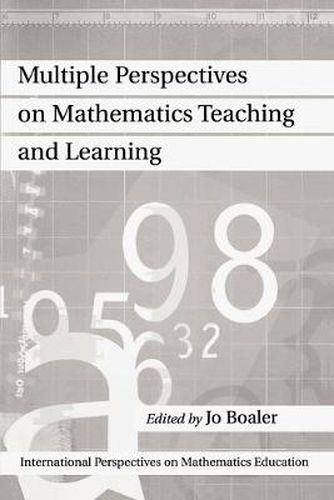Readings Newsletter
Become a Readings Member to make your shopping experience even easier.
Sign in or sign up for free!
You’re not far away from qualifying for FREE standard shipping within Australia
You’ve qualified for FREE standard shipping within Australia
The cart is loading…






Multiple Perspectives on Mathematics Teaching and Learning offers a collection of chapters that take a new look at mathematics education. Leading authors, such as Deborah Ball, Paul Cobb, Jim Greeno, Stephen Lerman, and Michael Apple, draw from a range of perspectives in their analyses of mathematics teaching and learning. They address such practical problems as: the design of teaching and research that acknowledges the social nature of learning, maximizing the impact of teacher education programs, increasing the learning opportunities of students working in groups, and ameliorating the impact of male domination in mixed classrooms.
These practical insights are combined with important advances in theory. Several of the authors address the nature of learning and teaching, including the ways in which theories and practices of mathematics education recognize learning as simultaneously social and individual. The issues addressed include teaching practices, equity, language, assessment, group work and the broader political context of mathematics reform. The contributors variously employ sociological, anthropological, psychological, sociocultural, political, and mathematical perspectives to produce powerful analyses of mathematics teaching and learning.
$9.00 standard shipping within Australia
FREE standard shipping within Australia for orders over $100.00
Express & International shipping calculated at checkout
Multiple Perspectives on Mathematics Teaching and Learning offers a collection of chapters that take a new look at mathematics education. Leading authors, such as Deborah Ball, Paul Cobb, Jim Greeno, Stephen Lerman, and Michael Apple, draw from a range of perspectives in their analyses of mathematics teaching and learning. They address such practical problems as: the design of teaching and research that acknowledges the social nature of learning, maximizing the impact of teacher education programs, increasing the learning opportunities of students working in groups, and ameliorating the impact of male domination in mixed classrooms.
These practical insights are combined with important advances in theory. Several of the authors address the nature of learning and teaching, including the ways in which theories and practices of mathematics education recognize learning as simultaneously social and individual. The issues addressed include teaching practices, equity, language, assessment, group work and the broader political context of mathematics reform. The contributors variously employ sociological, anthropological, psychological, sociocultural, political, and mathematical perspectives to produce powerful analyses of mathematics teaching and learning.